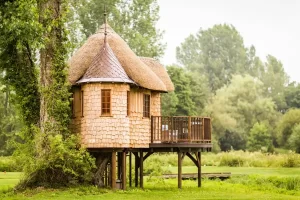In recent years, the travel industry has experienced a significant shift as more people seek to minimize their environmental impact. This growing demand for sustainable travel and eco-conscious living is not just a trend but a reflection of a broader commitment to preserving our planet for future generations. From reducing carbon footprints to supporting local communities, travelers are increasingly looking for ways to make their journeys more meaningful and responsible.
In response to this shift, the hospitality industry has risen to the challenge, offering a diverse range of eco-friendly accommodations that cater to the modern traveler’s desire for luxury without compromising sustainability. This article delves into the world’s finest eco-friendly accommodations, showcasing how these establishments seamlessly blend comfort, style, and a deep respect for the environment. Whether you’re a seasoned eco-warrior or a curious traveler looking to make a positive impact, these sustainable stays promise unforgettable experiences that align with your values.
The Importance of Eco-Friendly Accommodations
Eco-friendly accommodations are lodging establishments designed and operated with a commitment to minimizing environmental impact while providing comfortable and sustainable experiences for guests. These accommodations incorporate sustainable practices in various aspects, including energy usage, water conservation, waste management, and the use of eco-friendly materials. The goal is to create a harmonious balance between luxury and responsibility, ensuring that guests can enjoy their stay without compromising the health of the planet.
Choosing eco-friendly accommodations offers a multitude of benefits beyond just a guilt-free stay. Environmentally, these lodgings reduce carbon footprints by utilizing renewable energy sources, conserving water, and managing waste efficiently. Socially, they often support local communities by sourcing materials and food locally, employing local staff, and contributing to regional economies. Economically, sustainable tourism encourages long-term profitability by attracting environmentally conscious travelers who are willing to invest in experiences that align with their values. This approach not only preserves natural resources but also fosters cultural preservation and economic resilience in local communities.
The global travel industry is undergoing a transformation as green travel gains momentum. This shift is driven by increasing awareness of environmental issues and a growing desire among travelers to leave a positive impact. The trend towards sustainable tourism is evident in the rise of eco-friendly accommodations, which cater to a market that prioritizes ethical and environmentally responsible choices. This movement is reshaping the hospitality industry, encouraging more businesses to adopt sustainable practices to meet the demands of a new generation of conscious travelers.
Key Features of Eco-Friendly Accommodations
Energy Efficiency: Solar Panels, Renewable Energy Sources, and Smart Technology
One of the hallmarks of eco-friendly accommodations is their commitment to energy efficiency. Many of these lodgings utilize solar panels and other renewable energy sources, such as wind or geothermal power, to reduce reliance on fossil fuels. Additionally, smart technology is often employed to monitor and optimize energy usage, ensuring that lighting, heating, and cooling systems operate only when needed. This not only minimizes the environmental footprint but also provides guests with modern, tech-savvy amenities that enhance their comfort.
Water Conservation: Rainwater Harvesting, Water Recycling, and Low-Flow Fixtures
Water conservation is a critical aspect of sustainable accommodations. Many eco-friendly lodgings implement rainwater harvesting systems to collect and store water for various uses, reducing the demand on local water supplies. Water recycling technologies are also commonly used, allowing for the reuse of greywater for irrigation and other non-potable purposes. Additionally, low-flow fixtures, such as showers and toilets, are installed to reduce water consumption without compromising guest experience. These measures help preserve precious water resources, particularly in regions where water scarcity is a concern.
Waste Management: Recycling Programs, Composting, and Waste Reduction Initiatives
Effective waste management is another key feature of eco-friendly accommodations. These lodgings often implement comprehensive recycling programs, ensuring that materials such as paper, glass, and plastic are properly sorted and repurposed. Composting organic waste, such as food scraps and garden waste, is another common practice, contributing to nutrient-rich soil that can be used in on-site gardens. Additionally, waste reduction initiatives, such as minimizing single-use plastics and encouraging guests to reuse towels and linens, further reduce the environmental impact of the accommodation.
Sustainable Materials: Use of Local, Organic, and Sustainable Building Materials
Eco-friendly accommodations prioritize the use of sustainable building materials that are sourced locally and responsibly. This includes organic materials such as bamboo, reclaimed wood, and natural stone, which not only reduce the carbon footprint associated with transportation but also support local economies. The design and construction of these lodgings often emphasize energy efficiency and minimal environmental disruption, creating spaces that blend seamlessly with their natural surroundings.
Local and Organic Cuisine: Farm-to-Table Dining, Organic Food Sourcing, and Support for Local Farmers
A commitment to sustainability extends to the culinary offerings at eco-friendly accommodations. Many of these lodgings feature farm-to-table dining experiences, where ingredients are sourced locally and often grown on-site. This approach not only ensures the freshest possible meals but also reduces the environmental impact associated with transporting food over long distances. By supporting local farmers and using organic produce, these accommodations contribute to sustainable agriculture and provide guests with a deeper connection to the region’s culinary traditions.
Biodiversity Preservation: Accommodations that Protect and Enhance Local Ecosystems
Preserving and enhancing local ecosystems is a core value of eco-friendly accommodations. These lodgings are often located in or near sensitive natural areas, such as rainforests, wetlands, or coastal regions, and are designed to minimize their ecological footprint. Measures such as protecting native flora and fauna, restoring natural habitats, and reducing light and noise pollution are commonly implemented. Additionally, some eco-friendly accommodations engage in reforestation projects or support conservation efforts, actively contributing to the preservation of biodiversity in their regions.
This blend of thoughtful design, responsible practices, and a deep respect for nature sets eco-friendly accommodations apart, offering guests a chance to experience the beauty of the world while helping to protect it.
Top Eco-Friendly Accommodations Around the World
Asia: Luxurious Yet Sustainable Resorts
Asia is home to some of the most breathtaking eco-friendly accommodations, where luxury and sustainability go hand in hand. In Bhutan, the Six Senses Bhutan stands out for its commitment to preserving the kingdom’s unique environment and culture. The resort uses locally sourced materials, renewable energy, and offers organic, farm-to-table dining. In Indonesia, Bawah Reserve, located in the Anambas Archipelago, is a pristine eco-resort that employs solar energy, practices water conservation, and ensures that the surrounding marine ecosystem remains untouched. Meanwhile, in Thailand, Soneva Kiri offers guests a blend of luxury and environmental responsibility with its solar-powered villas, organic gardens, and zero-waste philosophy, all nestled in a tropical paradise.
Europe: Eco-Chic Hotels and Retreats
Europe’s dedication to sustainability is reflected in its diverse range of eco-chic hotels and retreats. In Sweden, the Treehotel offers guests a unique experience in the heart of nature, with treehouses designed by leading architects that blend seamlessly into the surrounding forest. The hotel is committed to sustainability, using renewable energy and eco-friendly materials. In Switzerland, the Whitepod Hotel provides an extraordinary glamping experience in geodesic domes that minimize environmental impact, featuring renewable energy sources and a focus on local, organic cuisine. In Portugal, the Areias do Seixo Charm Hotel is a shining example of eco-luxury, with its use of solar panels, geothermal energy, and sustainable construction methods, all while offering a stunning coastal retreat.
North America: Sustainable Lodges and Eco-Resorts
North America offers a variety of sustainable lodges and eco-resorts that cater to the environmentally conscious traveler. In the United States, the Bardessono Hotel in California’s Napa Valley is a LEED Platinum-certified hotel that emphasizes energy efficiency, water conservation, and organic, locally sourced food. In Canada, Clayoquot Wilderness Lodge in British Columbia combines luxury with eco-sensitivity, offering safari-style tents with minimal environmental impact in a pristine wilderness setting. Costa Rica is a global leader in eco-tourism, and the Lapa Rios Lodge on the Osa Peninsula is a perfect example, with its commitment to protecting the rainforest, supporting local communities, and offering sustainable accommodations that blend into the natural landscape.
South America: Eco-Friendly Accommodations
South America boasts a range of eco-friendly accommodations that highlight the continent’s natural beauty. In Brazil, the Anavilhanas Jungle Lodge in the Amazon is an eco-lodge that prioritizes the conservation of the rainforest, using sustainable practices to minimize impact on the environment while offering guests a unique experience in the heart of the Amazon. In Peru, Inkaterra Machu Picchu Pueblo Hotel is a pioneer in eco-tourism, blending Andean culture with sustainability efforts that include reforestation projects, wildlife preservation, and a commitment to preserving the local heritage. In Chile, Tierra Patagonia is an eco-friendly resort that seamlessly integrates with the surrounding landscape of Torres del Paine National Park, using sustainable materials and renewable energy to create a luxurious yet environmentally conscious experience.
Africa: Green Lodges and Camps
Africa’s vast wilderness is home to some of the world’s most remarkable green lodges and camps. In Kenya, Ol Donyo Lodge offers a sustainable safari experience, combining luxury with a deep commitment to conservation and community support. The lodge uses solar power, recycles water, and employs sustainable construction methods, all while contributing to wildlife preservation efforts. In Tanzania, the Singita Sabora Tented Camp in the Grumeti Reserve exemplifies eco-luxury with its low-impact design, use of solar energy, and dedication to protecting the surrounding ecosystem. South Africa is a leader in sustainable tourism, and the Grootbos Private Nature Reserve near Cape Town is a standout, focusing on conservation, community development, and offering eco-friendly accommodations that allow guests to connect with nature in a meaningful way.
Oceania: Sustainable Stays
Oceania is renowned for its commitment to sustainability, with a variety of eco-friendly accommodations that showcase the region’s natural beauty. In Australia, the Longitude 131° resort in Uluru-Kata Tjuta National Park offers luxury accommodations with a focus on environmental stewardship, using solar power, water conservation systems, and a design that blends into the surrounding landscape. New Zealand is famous for its eco-friendly tourism, and the Hapuku Lodge + Tree Houses in Kaikoura offers a unique stay in treehouses built from sustainable materials, with a strong emphasis on conservation and organic, locally sourced food. In Fiji, the Jean-Michel Cousteau Resort stands out for its dedication to marine conservation, using sustainable practices and offering eco-friendly accommodations that allow guests to explore the rich marine life of the South Pacific while minimizing their impact on the environment.
These eco-friendly accommodations not only offer luxurious experiences but also represent a commitment to preserving the planet’s natural resources, ensuring that future generations can enjoy these beautiful destinations.
Case Studies: Pioneers in Eco-Friendly Hospitality
Profile of Leading Accommodations: In-Depth Look at a Few Standout Eco-Friendly Accommodations
When it comes to eco-friendly hospitality, certain accommodations have set the bar high, becoming pioneers in sustainable tourism. One such leader is Soneva Fushi in the Maldives. This luxurious resort has garnered global recognition for its zero-waste policy, extensive solar power usage, and dedication to marine conservation. Soneva Fushi goes beyond traditional luxury by integrating sustainability into every aspect of its operations, from organic food sourcing to water recycling systems.
Another standout is Hoshinoya Karuizawa in Japan, a resort that harmonizes with its natural surroundings through innovative energy conservation methods, including the use of geothermal heating and hydroelectric power generated by the local river. The resort also supports biodiversity through reforestation projects and sustainable farming practices, offering guests an immersive experience in nature while preserving the local ecosystem.
In Costa Rica, the Lapa Rios Lodge stands as a beacon of eco-tourism. Located in a private nature reserve on the Osa Peninsula, Lapa Rios integrates sustainability into its core operations, using solar energy, rainwater collection, and an on-site waste treatment facility. The lodge’s commitment to conservation is evident in its efforts to protect the rainforest and its inhabitants, offering guests not just a place to stay, but a chance to contribute to the preservation of one of the world’s most biodiverse regions.
Sustainability Practices: Specific Initiatives That Set These Accommodations Apart
What sets these accommodations apart is their unwavering commitment to innovative sustainability practices. At Soneva Fushi, the resort’s Eco Centro complex is a prime example, where waste is transformed into resources through composting, recycling, and upcycling. The resort’s Coral Restoration Program is another standout initiative, helping to rebuild damaged coral reefs and promote marine biodiversity.
Hoshinoya Karuizawa excels in energy efficiency, using a unique water cooling system derived from the local river, which not only reduces energy consumption but also minimizes the impact on the environment. The resort’s involvement in the preservation of native species, including the Japanese serow, further underscores its dedication to environmental stewardship.
At Lapa Rios Lodge, sustainability is embedded in daily operations, from the use of solar panels to generate electricity to the lodge’s farm-to-table dining that supports local agriculture. The lodge also engages in educational programs for both guests and local communities, fostering a deeper understanding of conservation and sustainability.
Guest Experiences: Testimonials and Reviews from Travelers Who Have Stayed at These Eco-Friendly Accommodations
Guests who have stayed at these pioneering eco-friendly accommodations often share their transformative experiences. At Soneva Fushi, travelers frequently praise the resort’s ability to blend luxury with sustainability, describing how they felt more connected to nature through the resort’s immersive experiences, such as snorkeling with marine biologists and participating in beach clean-ups. One guest remarked, “Staying at Soneva Fushi isn’t just a vacation; it’s a journey into the heart of environmental stewardship.”
Hoshinoya Karuizawa receives glowing reviews for its tranquil setting and innovative sustainability practices. Guests often highlight the resort’s seamless integration with nature, with one traveler stating, “The commitment to preserving the local environment was evident in every aspect of our stay. It’s rare to find a place where luxury and nature coexist so harmoniously.”
At Lapa Rios Lodge, the emphasis on conservation and community involvement resonates deeply with visitors. Reviews often mention the educational aspects of the stay, with many guests appreciating the opportunity to learn about the rainforest and its ecosystems. One guest shared, “Lapa Rios isn’t just a place to stay; it’s a place that changes your perspective on the environment and your role in protecting it.”
Tips for Choosing Eco-Friendly Accommodations
Certifications to Look For: LEED, Green Globe, EarthCheck, and Other Relevant Certifications
When choosing eco-friendly accommodations, it’s important to look for certifications that verify the establishment’s commitment to sustainability. LEED (Leadership in Energy and Environmental Design) is one of the most recognized certifications globally, indicating that a building meets strict criteria for energy efficiency, water conservation, and environmental impact. Green Globe is another reputable certification, focusing on sustainability in tourism and hospitality, covering areas such as environmental management, social responsibility, and energy efficiency. EarthCheck is widely used in the travel and tourism industry, assessing hotels on criteria like greenhouse gas emissions, waste management, and social impact. These certifications provide assurance that the accommodation has met rigorous standards and is genuinely committed to sustainability.
Questions to Ask: Key Questions to Determine the Sustainability of a Potential Stay
To ensure that your chosen accommodation is truly eco-friendly, consider asking the following questions:
- What sustainable practices do you have in place? This could include energy sources, water conservation methods, waste management, and the use of local or organic materials.
- Are you involved in any conservation or community support initiatives? Understanding how the accommodation contributes to local environmental and social efforts can give insight into their broader impact.
- What steps are taken to minimize environmental impact during my stay? This might involve practices like linen reuse programs, energy-efficient lighting, or providing eco-friendly toiletries.
These questions can help you gauge the level of commitment the accommodation has towards sustainability and ensure that your stay aligns with your environmental values.
Booking Platforms: Websites and Apps That Specialize in Eco-Friendly Accommodations
Finding eco-friendly accommodations has become easier with the rise of specialized booking platforms. Websites like EcoBnB and BookDifferent focus exclusively on sustainable travel options, offering a curated selection of hotels and lodges that meet rigorous environmental standards. Green Pearls highlights boutique and luxury hotels that emphasize sustainability in their operations, while Kind Traveler allows users to book hotels that give back to local communities and environmental causes. These platforms not only provide a range of eco-friendly options but also offer detailed information on the sustainability practices of each accommodation, making it easier for travelers to make informed choices that support their commitment to the environment.
Conclusion
In a world where the environmental impact of our choices is increasingly evident, the importance of selecting eco-friendly accommodations cannot be overstated. These sustainable lodgings offer more than just a place to rest—they provide an opportunity to travel responsibly, support local communities, and preserve the natural beauty of our planet for future generations. By prioritizing accommodations that adhere to sustainable practices, travelers can play a vital role in reducing the environmental footprint of tourism while still enjoying luxurious and enriching experiences.
As you plan your next journey, consider the impact of where you choose to stay. Opting for eco-friendly accommodations is a powerful way to contribute to the global green movement, ensuring that the destinations we cherish today remain vibrant and healthy for years to come. Make your travels meaningful by choosing sustainability, and let your adventures be a testament to your commitment to protecting our world.




